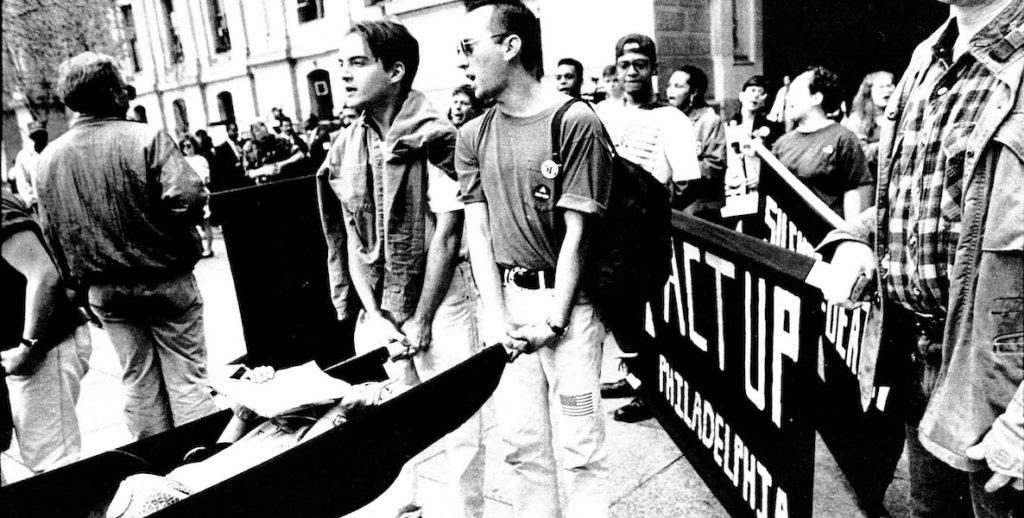ACT UP’s Bush AIDS Flag. Too Much Graphics’“Never Again! Fight Back!” poster. Dozens of mimeographed newsletters from queer periodicals. These rare pieces of ephemera tell a story of activism and history in the LGBTQ community—and this month, they are on display for the first time at the William Way LGBT Community Center.
The idea for the exhibit started two years ago, when John Anderies, director of the John J. Wilcox, Jr. Archives at William Way, and Brad Duncan, author of Finally Got the News: The Printed Legacy of the U.S. Radical Left, 1970-1979, started wondering how they could collaborate on an archival exhibit.
From a model of longtime gay nightclub Woody’s Bar to half the collection of still-unclaimed 1957 gay wedding photos, the pair had a swath of disparate materials to choose from—a reflection of the archives’ history.
The predecessor of today’s William Way, the Gay Community Center of Philadelphia, opened in 1976 and included a library in its first building. At this time, the center began saving its own business records and, throughout the years, as it moved from building to building, the growing library and the center’s records moved with it. In 1990, the Gay/Lesbian Archives were donated to William Way and formed the nucleus of the present archival collection.
After years of collecting personal papers, organizational records, periodicals, audiovisual material and ephemera documenting the history of Philadelphia’s LGBTQ community, the archive is one of the most extensive, active and important collections of its kind in the country.
Anderies and Duncan spent a year exploring different topics in the mostly unfocused archive and created an exhibit that intersects several activist movements: Black Power, New Left, anti-war, LGBTQ, and women’s liberation. The material comes from local archives and collectors.
Unlike previous decades, Anderies says that, during the period highlighted in this exhibit, people were particularly energized and ready to get involved in activism throughout the country because of the Stonewall Uprising. Many either had past experience in activism or were influenced by other actions, like the feminist and Black Power movements.
“In the early ’70s, we see an early burgeoning queer left movement,” says Anderies. “Then there are the forces that LGBTQ people have to deal with, like the rise of the religious right and HIV/AIDS, and we begin to see the mainstream LGBTQ society choose the status quo, like same-sex marriage and serving in the military. The narrative sounds like the radical left goes away, but that’s not true.”
“No matter how dire things may seem today, change is always possible,” Anderies says.
Using these rare archival materials—ranging from handmade banners to historic newsletters—The Most Revolutionary shines a light on the radical ideas and movements that exploded in the late 1960s and how they continue to shape our world today.
Visitors can explore a vast array of rare buttons, flyers and posters about issues including the AIDS crisis, U.S. involvement in Central America, racism in the gay community, and labor organizing.
“I hope for people to be inspired by what the elders have done,” he notes. “And no matter how dire things may seem today, that change is always possible.”
Through December 27th, Monday-Friday, 11 am-10 pm and Saturday-Sunday, 12 pm-5 pm, Free, William Way LGBT Community Center, 1315 Spruce Street

